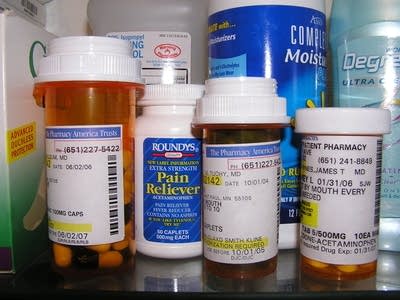Minnesota doctors want drug disposal research and guidelines
Go Deeper.
Create an account or log in to save stories.
Like this?
Thanks for liking this story! We have added it to a list of your favorite stories.

When her elderly mother died in May, Jeanie Picardi and her siblings had to clean out her apartment.
Picardi expected to find a lot of unused medication because her mother had been ill for a long time. But she was shocked when she filled up two garbage bags with pain killers like Oxycontin and morphine, along with drugs for depression, anxiety, and heart problems.

Unsure about what to do with the drugs, Picardi called a hospice nurse, a social worker and a pharmacist for advice.
"When they said 'flush em,' I'm thinking now this is an environmental hazard," says Picardi. "You know, the whole idea of putting morphine down the toilet and then how well does it get cleaned out? I don't know those things, but after you're told by three people you figure well it must get cleaned out okay."
Turn Up Your Support
MPR News helps you turn down the noise and build shared understanding. Turn up your support for this public resource and keep trusted journalism accessible to all.
Actually, it doesn't get cleaned out. For several years now researchers have been finding trace amounts of pharmaceuticals in many of the nation's water bodies. Highly sensitive new tests have helped scientists detect dozens and dozens of chemicals, from depression and cholesterol medications to ibuprofen and caffeine.
Researchers suspect that many of these drugs are simply excreted in human waste. But they also say many drugs are needlessly flushed into the system as a method of disposing of unused or expired medication.
It's this latter practice that most concerns members of the Minnesota Medical Association. Dr. Sam Hall, who serves on the MMA subcommittee that drew up the EPA request, says so far there's no evidence the chemicals pose a major health hazard for the public or the environment.

But he says no one has spent much time studying the matter either.
"There's enough to know that this is at least a theoretical problem," says Hall. "Beyond that, we know that some studies have shown that for certain classes of chemicals, one being endocrine active compounds, that those chemicals can have adverse effects particularly in low concentrations on aquatic life - frogs, fish and the like."
Endocrine active compounds include substances like birth control pills which contain estrogen. These compounds, even in very low doses, have been shown to feminize male fish.
The EPA has been studying endocrine disrupters for several years. Gary Ankley, a toxicologist in the EPA's Office of Research and Development, works on the project in Duluth.
Ankley says it's easy to duplicate the effect of endocrine disrupters in the lab. But he says other types of pharmaceutical typically are not designed to promote physical changes in people or animals. So if they have an effect, it may be less obvious and it could take years to develop. Ankley says it seems like an issue worth studying.
"The reality is that a lot of pharmaceuticals are designed to be potent, that is, effective at very low concentrations," says Ankley. "And just because they're at low concentrations in the environment, doesn't mean that they don't have risk. And so yeah, probably we need to take a look at these."

For now the EPA isn't actively studying other types of pharmaceuticals in the water. The American Medical Association will urge the EPA to ramp up its pharmaceutical research and help develop guidelines for disposing of unused drugs.
Until then, there's a range of advice depending on who's giving it, which isn't very comforting to people like Jeanie Picardi.
"Nobody has a good answer. Nobody even has what you feel is the right answer," says Picardi. "Sometimes I think back and I think I should have worked harder. I should have done this. Or I should have done that. And then I think I didn't have it in me. You know, neither did my siblings. None of us had that energy to work harder on getting rid of them."
Picardi wishes some of the drugs could be re-used. But current regulations across much of the U.S. prohibit that.
Many caretakers still recommend flushing to ensure that drugs don't fall into the hands of small children. The Minnesota Office of Environmental Assistance doesn't recommend flushing. Instead the state agency recommends destroying the drugs with a liquid like water, wrapping them tightly in a plastic container like a margarine tub and then throwing them in the trash.
Dear reader,
Your voice matters. And we want to hear it.
Will you help shape the future of Minnesota Public Radio by taking our short Listener Survey?
It only takes a few minutes, and your input helps us serve you better—whether it’s news, culture, or the conversations that matter most to Minnesotans.




